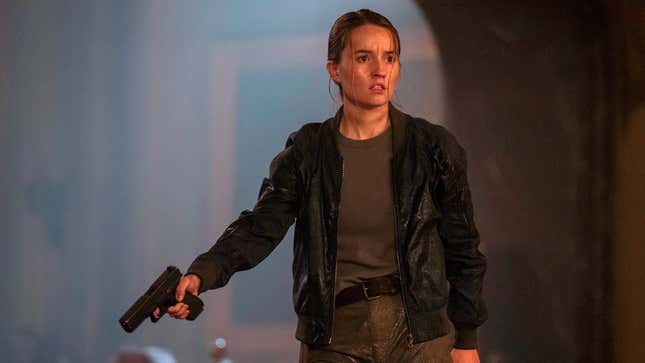
The Last of Us concluded its second season on Sunday with a pretty big cliffhanger, as HBO plans to adapt the story of The Last of Us Part II across three seasons in total. Here at Kotaku, I’ve been recapping each episode of the show, and I have not been having a good time. Frankly, I find it to be a mostly irredeemable attempt at adapting the narrative of the PS4 game. But what about the rest of the internet? Surely not everyone is as disappointed as I am and plenty of them enjoyed the show, right? Well, yeah. But they’re not quite as loud as the folks who weren’t thrilled with the finale and season at large.
To start on a positive note, despite fans being divided over Bella Ramsey’s performance as Ellie, with some criticizing it for its more immature approach to the character compared to Ashley Johnson’s in the game, several fans sang their praises of Ramsey’s work in the finale. Personally, I appreciated that the show pulled off Ellie’s disillusionment with the people of Jackson despite what I felt was poor writing, and Ramsey’s execution of this tension finally boiling over received some praise.
However, with the show reaching one of its most climactic moments in the finale, many game fans are growing increasingly frustrated with the embellishments HBO has made. Some take issue with how certain characters’ personalities have been altered, like Jesse being an asshole instead of the golden retriever we once knew, and Abby lacking the muscle that once signified her obsession with killing her father’s murderer. Despite some praise for Ramsey’s performance, many longtime fans remain critical of Ellie’s newfound sadism and how she seems far less confident than her game counterpart. This is on top of weeks of criticism from fans who think that Ellie feels infantilized in the show, especially when compared to her girlfriend Dina, who is carrying the angry, vengeful torch in her stead.
Character traits are one deviation from the source material fans are up in arms about, but perhaps the most controversial change in the finale involves the death of Mel. As in the game Ellie kills Mel, one of Abby’s friends who was with her on the expedition to kill Joel, but unlike in the game, here it’s an accident. Ellie fires a bullet at Mel‘s partner Owen and she just happens to be in the wrong place at the wrong time, as the shot goes right through him and into her. In the source material, this is one of the most impactful moments of Ellie’s revenge tour, as it also results in the death of Mel’s unborn child, making Ellie confront just how much collateral damage she’s caused in her myopic need for vengeance. Fans argue that by making this kill an accident, the show is undermining Ellie’s story which originally showed her undergoing a deliberate descent into violent rage, and instead lets her off the hook by shifting the blame.
Not everyone hates the change, though. Again, Ramsey’s skill at communicating Ellie’s devastation has received praise, and some view it as a moment of the character’s true compassion coming out.
A lot of this discourse can arguably be chalked up to “Game fans are just precious about the original scenes.” Some might believe the show should be judged on its own merits rather than compared to the game it’s adapting, but many, myself included, feel that even on its own terms, the show is a mess of tonal contradictions and confused characterization. To me, examining it through the lens of Sony’s attempts to further capitalize on the series, even to the detriment of its story and integrity, is the only way that it’s even interesting to talk about. If you take those elements away from the discussion, in my opinion the show is just bad in a boring way, with amateurish writing and inconsistent performances.
A lot of those problems are rooted in what seems to be an attempt to sanitize the original text and avoid controversy. However, the show’s inconsistent writing makes it feel like mash-up of competing stories in which Ellie’s motivations swap at the drop of a hat, which is frustrating to follow even without the context of playing the games. It’s easy to handwave criticisms as game fans simply not liking changes from the beloved source material, and if someone’s critique starts and ends with “the show is different than the games,” that’s not in and of itself making a qualitative point, it’s merely an observation. But as much as some people on both sides want to reduce the argument to dismissive extremes, the truth of the discussion exists somewhere in the middle, and right now it feels like some diehard game fans and show newcomers are ready to dismiss each other’s claims and praise on principle without hearing each other out.
Personally, I’ve found the show rewarding as a game fan because it’s been interesting to unpack why I think these changes are problems, rather than just being upset that it’s not recreating the game beat for beat. A lot of the show’s embellishments have felt like change for change’s sake. The Last of Us games felt very intentional in the story they wanted to tell, so taking a wrecking ball to so many characters and moments has made the show feel like a much less confident and coherent text. I don’t think it can be salvaged after this, but we’ll see if season three, which will primarily star Kaitlyn Dever as Abby, can turn things around.
.